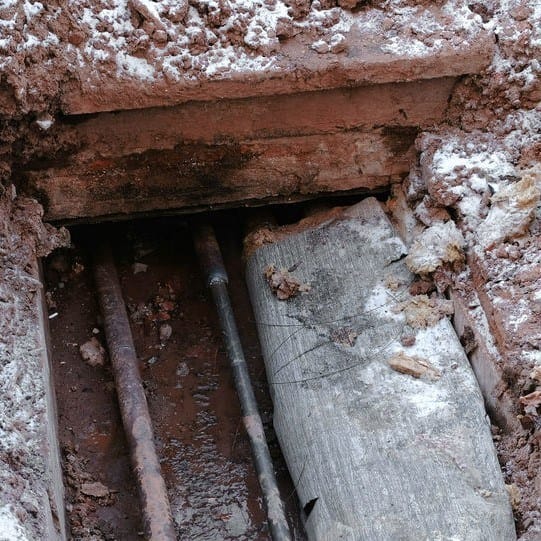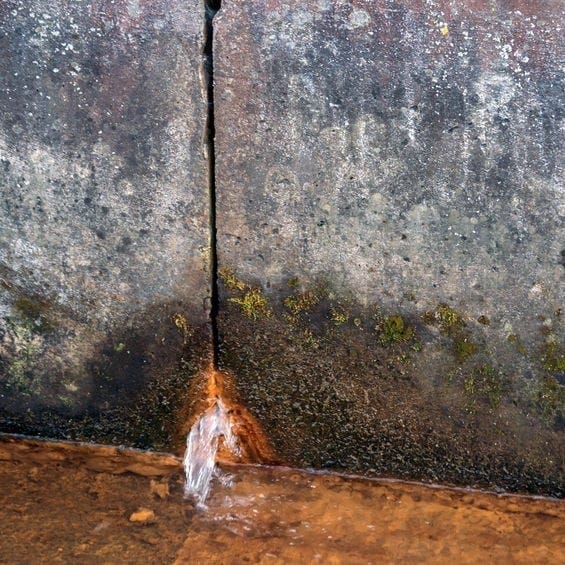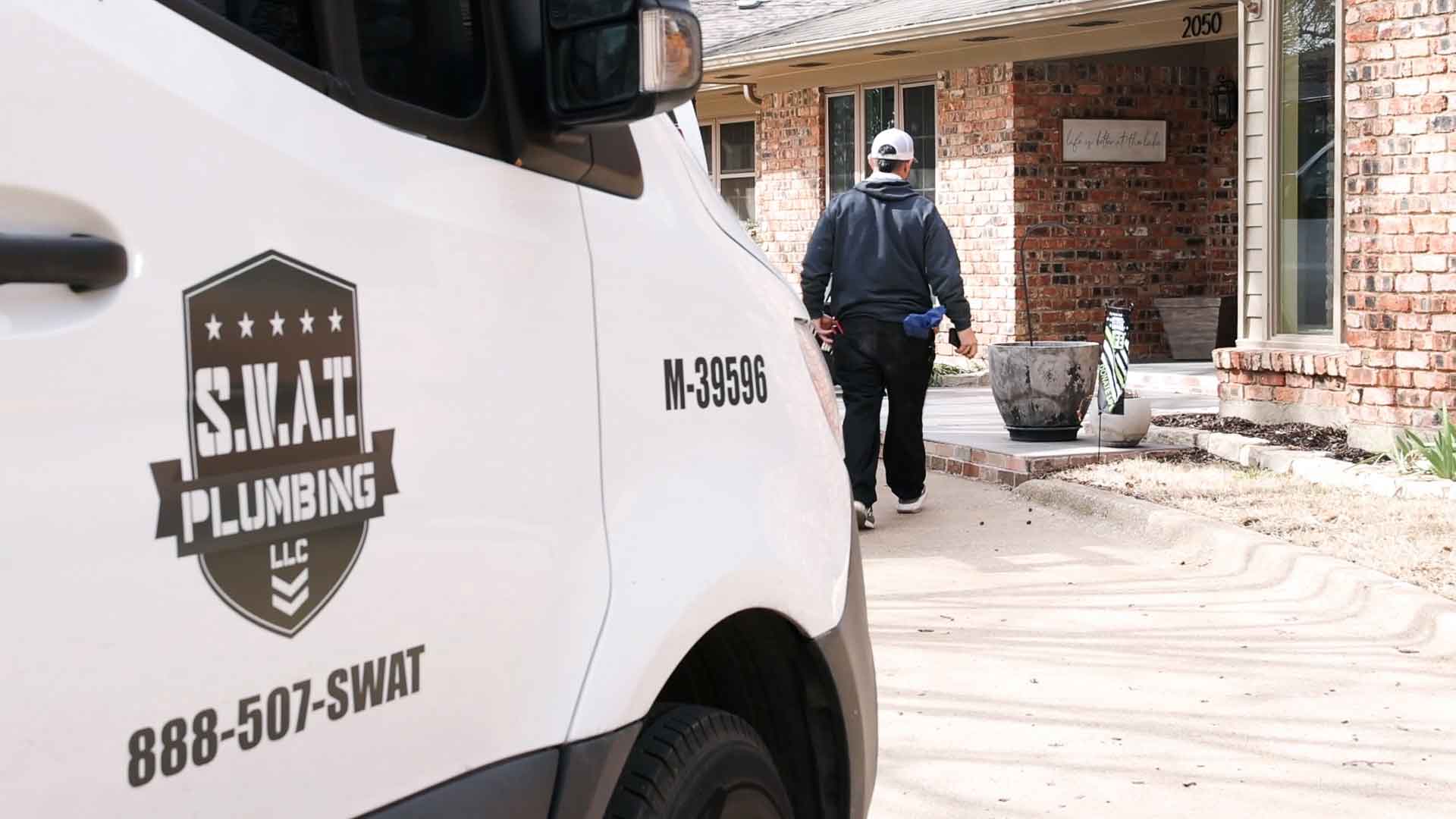A house built on a slab is considered to be an upgrade over a pier-n-beam home. Sitting on a solid piece of concrete instead of on beams with piers holding the beams gives a house a strong “foundation”, which is great. Until it gets a slab leak. Before a slab of concrete is poured for a house, the plumbing is laid and connected. A slab leak for house happens when any of that plumbing broken or deteriorating under the foundation.
A slab leak can go on forever. If the water doesn’t get shut off, it will leak on and on forever. A slab leak can go for hours, days, weeks, even months. This why they say there are two kinds of leaks: the leak you see and the leak you don’t see. Both can cause damage, but when you don’t see it, the damage can be a lot more severe.
Is a slab leak dangerous?
A lot of houses in Texas are built on a concrete foundation, making slab leaks more common that a homeowner would like. When a slab leak is discovered or suspected, it needs to be addressed immediately for several reasons.
- Health Concerns: A slab leak, like any water leak, will inevitably cause the surface around it to mildew and then mold forms. When your home has mold, it seeps into the air you’re breathing, and after an extended period, it could cause serious respiratory issues. If anyone already has respiratory issues, it will aggravate it, making it worse.
- Structural Concerns: A slab leak that is ignored or undiscovered will cause the structure of the house to rot, compromising the structure. The slab itself will buckle, crack, and shift, causing the walls to move, weaking the support of the roof.
How do you stop slab leaks?
When you discover you have a slab leak, you need to call a plumber immediately. If the water is gushing, turn it off at the main valve, located by the water meter for most homes. We’ll go further into to fixing and repairing slab leaks in a moment, but right now, here are things you can do to prevent a slab leak:
- Lower the water pressure from the meter to your home. Yes, high water pressure is great, but when it is at an excessive high pressure, it is hard on the pipes. If the pipes are old or weak, they will weaken and burst, resulting in a slab leak and more.
- Soften your hard water by installing a water softener. Hard water will have a negative impact on your home’s water pipes, so if you are living in an area with hard water, like many homes do in Texas, a water softener is you best defense in preventing a slab leak.
- Do use chemical drain cleaning agents to unclog your sinks or other plumbing. The chemical cleaners that are available on the market typically are full of harsh chemicals that will impact your water pipes negatively while getting rid of the clog. A better option is to use natural products, most of those you have already in the kitchen, and if they don’t work, call a plumber. A severe blockage may require the plumber to use hydro jetting process on your pipes, but that is much better than having a slab leak!
How do you fix a slab leak?
A slab leak is going to require you and your contractor to make decisions. Those decisions will take into consideration the possible existing property damage and the risk of more property damage. Factors that will have an effect on those decisions is the age, the existing materials, and the condition of the plumbing system. The first decision will be whether repairs are possible or is a whole repiping session the better option. With the first line of decisions made, there are four ways your slab leak can be repaired.
- Re-piping/Re-routing Pipes: If you can avoid digging, and do all the work above ground, it is better and easier all the way around. Your house and landscaping aren’t damaged any more than the slab leak has damaged, and the job is completed faster because the plumber can fix slab leak without jackhammering. However, if the plumbing lines are encased in slab foundation, and replumbing the house without slab destruction can be done by routing the pipes the slab. This can require new plumbing installed insides the walls, into and through the attic, closets, etc. so that the pipes are concealed and protected. With creative ingenuity, the plumbing can be hidden behind crown molding or other creative woodworking means.
- Breaking Through the Slab: The shortest distance to fix a slab leak is to go through the slab. It is disruptive, loud, messy, and expensive. This is the least popular decision and thankfully, modern technology has given us other options.
- Tunneling Under the Slab: There are several benefits to be had when the slab leak can be fixed by tunneling under it, with the first one being, you don’t have to stay in a hotel while the work is going on! Another big beneath is the crew won’t be making a mess inside your home, and last but not least, it is one of the less expensive processes to fix a slab leak. Your plumbing contractor may dig the tunnel, or they may hire an engineering crew to dig. Tunnel digging can compromise the structural integrity if not done correctly and that falls under the reign of engineering.
- Trenchless Pipe Repair: This is also referred to as pipe bursting or pipe lining and is a new technology that plumbers and homeowners alike prefer. This slab leak fix doesn’t require any jackhammering inside the house or trench digging outside. A simple description of this process, the plumber will dig two small holes, one on each end of the broken pipe. Then a new liner is pushed through one hole that will fill the broken pipe with a new liner.
How long does it take to repair a slab leak?

In most cases, depending on which of the methods is used and where the house is located, the average time for slab leak repair is two days. At the time your plumbing contractor gives you a description or estimate of the work to be done, they will give an estimation of time the job will take.
How does a slab leak and insurance fall into this? Well, you’re not going to like this, but in most cases, homeowner’s insurance is not going to pay for slab leak repair. You should review your policy or contact your agent to confirm this, better to do that now than wait until you have a slab leak problem. Homeowner’s insurance is primarily there for catastrophic happenings, not something that has developed over time.
Which is worse, a slab leak vs wall leak?
Both are bad news and both can cause a lot of damage. Unfortunately, when it comes to homeowner’s insurance, you got the same results – they are probably not going to cover the repair or the damage. Again, check your policy or talk to your agent so that you have a clear understanding where you are should a wall or slab leak happen to your home. Call 817-244-4370 today for slab leak detection in Fort Worth, TX.











